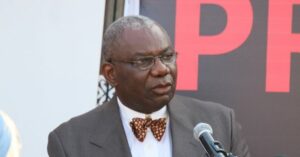Special topics

BOAKYE AGYARKO, ENERGY MINISTER
The Extractive sector under the 4th Republic has seen enormous changes over the past years. Formed in 1957, Ghana’s Energy and Petroleum Ministry was created with the key aim of extending and ensuring a continuous supply of energy services to every sector of the economy in an energy sufficient and environmentally friendly manner.
The ministry is also charged with the mandate to improve the distribution of electricity across the country, especially to communities in rural Ghana and to encourage the participation of the private sector in the development of energy infrastructure and thereby secure future energy supply for the country.
However, the ministry has an oversight responsibility of supervising state institutions like Ghana National Petroleum Corporation, Volta River Authority and Petroleum Commission Ghana. The ministry is headed by sector ministers who are normally appointed by a ruling Government.
In 1997 under former President John Rawlings, the then ministry was called the Ministry of Mines and Energy and was headed by Ferdinand Ohene-Kena and Dr. John Frank Abu in 1999 as minister and deputy respectively from 2001- 2005.
Then under former President John Kufuor, in 2001, the ministry was divided into two namely, the Ministry of Mines and the Ministry of Energy. The Energy Ministry was headed by Albert Kan Dapaah and Dr. Paa Kwesi Nduom respectively. During President Kuffour’s second tenure in 2005, he appointed Prof. Mike Ocquaye (2005-2006), Joseph Kofi Adda and Felix Owusu-Adjapong (2006- 2009) to handle the affairs of the ministry.
The 3rd President of the 4th Republic, John Fiifi Atta Mills in 2009 also introduced Joe Oteng-Adjei as the Minister for Energy (2009 – 2012).
Succeeding Joe Oteng- Adjei was Emmanuel Armah Kofi Buah in 2013. Under the Mahama-led Administration, the ministry was divided into two; the Ministry of Petroleum and Ministry of Energy appointing Emmanuel Armah Kofi Buah(2013-2016) and Dr. Kwabena Donkor (2013- 2015) as ministers respectively.
This according to the Former President was to go a long way to streamline all energy activities under one umbrella. This administration was confronted with enormous power instabilities. With memories of promises given by Dr. Kwabena Donkor, the minister vacated his position leaving it to the Finance Minister to head prior to the election year.
Currently, the newly elected President has merged the Ministry of Energy and the Petroleum Ministry. President Nana Addo Dankwa Akufo-Addo last week named Boakye Agyarko as the Minister Designate for the Ministry of Energy and Petroleum.
Mr. Boakye Agyarko was Policy Advisor for the 2016 campaign team of the New Patriotic Party (NPP).
The ruling party’s manifesto during the 2016 elections mentioned a total end to “DUMSOR” in the short-term, through government liquidity injection, restructuring of debts, and securing of firm commitments for the reliable supply of fuel. The manifesto also promised a reduction of taxes on electricity tariffs to provide immediate relief to households and industry under the energy sector.
Under the petroleum sector, the party promised to develop, in collaboration with the private sector, the western region into a regional oil services hub with a first class port facility, as well as positioning it as an efficient centre for back-office support for the oil industry in the West African region, including the relocation of the headquarters of GNPC to the region.
So the question now remains, with the ministries merged together, can these outlined promises be fulfilled?
By: Jacqueline Parditey- www.reportingoilandgas.org